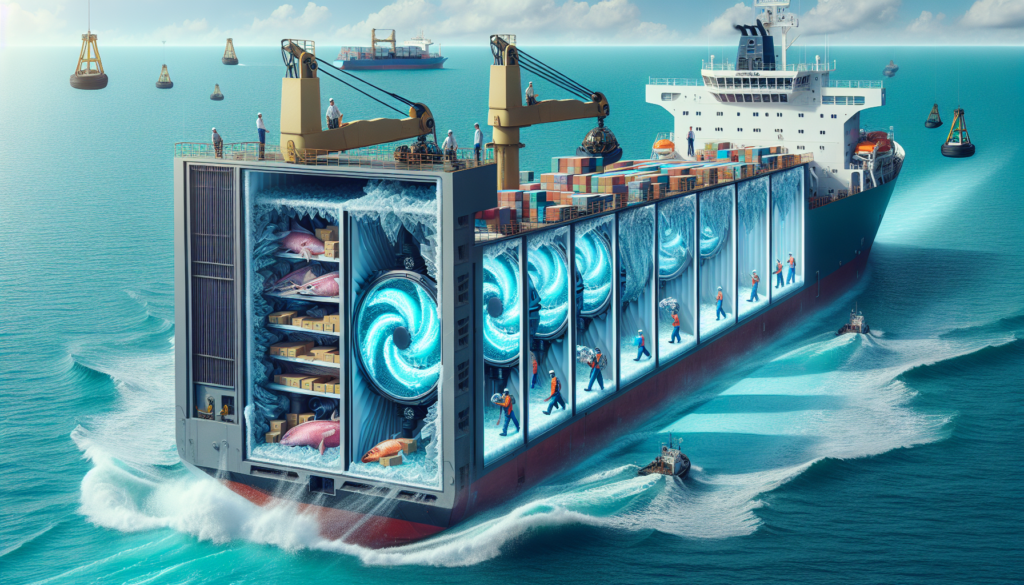Exploring the Depths of Marine Refrigeration
Imagine setting sail on a majestic cruise ship, enjoying the cool breeze of the ocean while savoring a refreshing drink from the onboard bar. Have you ever wondered how these vessels keep your beverages chilled, your food fresh, and your cabins comfortably cool even in the sweltering heat of the open sea? The answer lies in the fascinating world of marine refrigeration. In this comprehensive guide, we will delve into the inner workings of marine refrigeration systems, exploring their history, applications, technology, and future trends. Join us on this journey as we uncover the secrets behind keeping things cool on the high seas.
The Evolution of Marine Refrigeration
Marine refrigeration has come a long way since its inception in the early 19th century. The first refrigeration system designed specifically for ships was introduced in 1856 by James Harrison, an Australian inventor. This breakthrough allowed perishable goods to be transported over long distances without spoiling, revolutionizing the maritime industry. Over the years, advancements in technology have led to the development of more efficient and reliable refrigeration systems tailored to the unique challenges of marine environments.
Today, marine refrigeration plays a crucial role in various maritime sectors, including fishing, shipping, and cruise tourism. From preserving the catch of the day on fishing vessels to keeping passengers comfortable on luxury cruise ships, marine refrigeration systems have become indispensable onboard assets.
The Mechanics of Marine Refrigeration
At the heart of every marine refrigeration system is a complex network of components that work together to regulate temperature and humidity. These components include compressors, condensers, evaporators, expansion valves, and refrigerants. The compressor is the engine of the system, responsible for circulating the refrigerant through the various components to extract heat from the enclosed space.
The condenser then cools the refrigerant, causing it to condense into a liquid state. This liquid refrigerant is then passed through an expansion valve, where it undergoes a rapid expansion, converting it into a low-pressure gas. As the gas flows through the evaporator, it absorbs heat from the surrounding air, lowering the temperature inside the refrigerated space. This continuous cycle of compression, condensation, expansion, and evaporation allows marine refrigeration systems to maintain the desired temperature levels effectively.
Applications of Marine Refrigeration
Marine refrigeration systems are used in a wide range of applications onboard ships and offshore platforms. In the fishing industry, refrigerated seawater (RSW) systems are commonly employed to preserve the freshness of the catch and extend its shelf life. These systems pump cold seawater through the fish holds, maintaining the ideal temperature for storing seafood until it reaches the shore.
In the shipping industry, refrigerated cargo vessels transport perishable goods such as fruits, vegetables, and dairy products across the globe. These vessels are equipped with temperature-controlled containers that can maintain a specific temperature range throughout the journey, ensuring that the cargo arrives at its destination in optimal condition.
On cruise ships and luxury yachts, marine refrigeration systems are used to refrigerate food and beverages, store medical supplies, and maintain comfortable living conditions for passengers and crew. These systems are designed to operate seamlessly in challenging marine environments, providing reliable cooling solutions for onboard facilities.
Challenges and Innovations in Marine Refrigeration
Despite their importance, marine refrigeration systems face several challenges unique to the maritime industry. The corrosive nature of seawater, fluctuating temperatures, and limited space onboard ships pose significant obstacles to the effective operation of refrigeration equipment. To address these challenges, manufacturers are constantly innovating and developing new technologies to enhance the performance and efficiency of marine refrigeration systems.
One such innovation is the use of eco-friendly refrigerants that have a lower impact on the environment compared to traditional refrigerants. As global regulations tighten on the use of harmful gases like CFCs and HFCs, the maritime industry is shifting towards more sustainable alternatives that are ozone-friendly and have a lower global warming potential.
Another trend in marine refrigeration is the integration of smart technologies and remote monitoring systems that allow operators to track and control the performance of refrigeration units from shore. These real-time monitoring solutions provide valuable data on energy consumption, temperature levels, and system diagnostics, enabling proactive maintenance and troubleshooting to prevent downtime and costly repairs.
Future Trends and Outlook
Looking ahead, the future of marine refrigeration is poised for further advancements and innovations as the industry embraces sustainability, digitalization, and automation. With the growing focus on reducing carbon emissions and operating costs, shipowners are investing in energy-efficient refrigeration systems that optimize cooling performance while minimizing environmental impact.
Technological advancements such as magnetic refrigeration, thermoelectric cooling, and hybrid systems are being explored as potential alternatives to conventional compression-based refrigeration. These emerging technologies offer the promise of higher efficiency, lower maintenance requirements, and reduced energy consumption, making them attractive options for the maritime sector.
Furthermore, the adoption of predictive maintenance strategies and condition monitoring tools is expected to increase, allowing ship operators to detect potential issues before they escalate and optimize the performance of their refrigeration systems. By leveraging data analytics and machine learning algorithms, maritime companies can maximize the reliability and longevity of their equipment, ensuring smooth operations and enhanced safety onboard.
Expert Opinions
We reached out to Dr. Sarah Lee, a marine refrigeration specialist with over 20 years of experience in the industry, for her insights on the future of marine refrigeration. According to Dr. Lee, “The maritime sector is at a critical juncture where sustainability and efficiency are top priorities. As regulations tighten and customer expectations evolve, there is a growing demand for innovative refrigeration solutions that can deliver optimal performance while minimizing environmental impact.”
She also emphasized the importance of collaboration between manufacturers, shipowners, and regulatory bodies to drive the development of eco-friendly refrigeration technologies and ensure compliance with international standards. Dr. Lee’s expertise highlights the ongoing shift towards greener, smarter, and more sustainable refrigeration solutions in the maritime industry.
Common Misconceptions
One common misconception about marine refrigeration is that it operates in the same way as land-based refrigeration systems. In reality, marine refrigeration systems face unique challenges such as limited space, high humidity, and exposure to harsh marine conditions that require specialized design and engineering solutions.
Another misconception is that all refrigerants used in marine systems are harmful to the environment. While some refrigerants like CFCs and HCFCs have been phased out due to their ozone-depleting properties, modern refrigerants are designed to be more eco-friendly and comply with international regulations on greenhouse gas emissions.
Conclusion
To wrap things up, marine refrigeration is a crucial component of modern maritime operations, enabling the safe storage and transport of perishable goods, maintaining comfortable living conditions onboard ships, and supporting sustainable practices in the industry. As technology continues to evolve and environmental concerns drive innovation, the future of marine refrigeration looks promising with a focus on efficiency, sustainability, and reliability.
Whether you’re a seasoned seafarer or a landlubber curious about the mysteries of the ocean, understanding the intricacies of marine refrigeration can shed light on the hidden world of refrigeration at sea. As we sail towards a more sustainable future, the role of marine refrigeration will play a vital part in shaping the maritime industry for generations to come.



